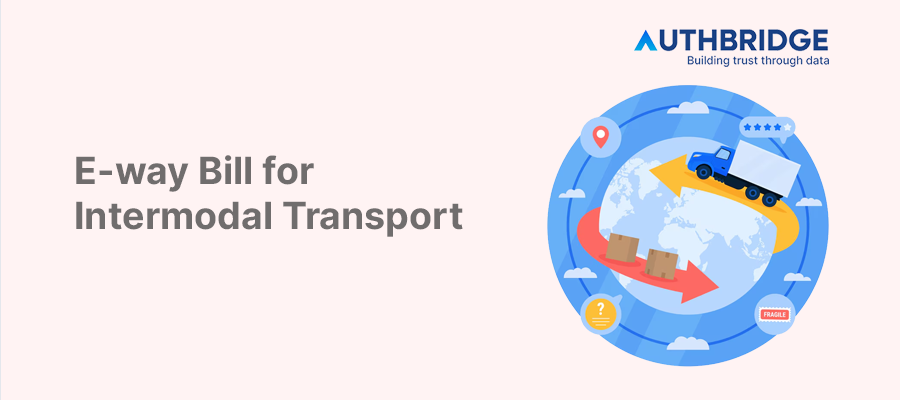Navigating The E-way Bill System In Intermodal Transport: A Comprehensive Guide

Intermodal transport, involving the movement of goods using multiple modes of transportation like road, rail, and sea, plays a pivotal role in modern supply chains. Efficient intermodal logistics is essential for improving connectivity, reducing costs, and streamlining operations. In India, the e-way bill (EWB) system is crucial in ensuring seamless and compliant movement of goods, even in complex intermodal scenarios. This comprehensive guide explores E-way bills in intermodal transport, drawing insights and data from verified sources like the Central Board of Indirect Taxes and Customs (CBIC) website (https://www.cbic.gov.in/) and industry reports.
What is an E-way Bill?
- An E-way bill is an electronic document required for the movement of goods exceeding ₹50,000 in value under India's Goods and Services Tax (GST) regime. It facilitates transparency, efficiency, and compliance for the transport of goods across borders.
- The EWB is generated on the e-way bill portal (https://ewaybillgst.gov.in/).
- Key information captured in an EWB includes:
- Supplier and recipient details
- Transporter details
- Description of goods (including HSN code)
- Value of goods
E-way Bills and Intermodal Transport
- Applicability : An EWB is required for every movement of goods exceeding ₹50,000 in value, regardless of the number of transportation modes involved.
- Responsibility: It is the responsibility of the person causing the movement of goods (supplier, recipient, or transporter, based on agreed terms) to ensure the generation of an EWB.
- Multi-modal scenarios: When goods are transported using multiple modes, the EWB must be updated with details of each transporter involved to maintain a clear audit trail.
Data and Statistics
- A report by the Logistics Skill Council (LSC) highlights that the Indian logistics sector is expected to reach a value of USD 307 billion by 2030, emphasizing the growing importance of efficient intermodal transport processes and EWB compliance.
- As of December 2023, the e-way bill portal statistics show over 14.5 billion EWBs generated, indicating the system's widespread adoption in diverse sectors, including those using intermodal transport.
Table 1: EWB Applicability for Intermodal Transport
Scenario | EWB Required? |
Goods transported by road, exceeding ₹50,000 | Yes |
Goods transported by rail, exceeding ₹50,000 | Yes |
Goods transferred from road to sea mode, exceeding ₹50,000 | Yes |
Benefits of E-way Bills in Intermodal Transport
- Enhanced Transparency: EWBs increase transparency by tracking goods, transporters, and routes, promoting accountability and collaboration in complex multimodal scenarios.
- Improved Efficiency: Electronic documentation reduces paperwork and speeds up the movement of goods through checkpoints, optimizing delivery processes in intermodal transport.
- Reduced Compliance Risk: EWBs ensure GST compliance, reducing the risk of penalties and disruptions during transfers between different modes of transportation.
Challenges and Solutions in E-way Bill Management for Intermodal Transport
Challenges
- Frequent transfer of goods: Constant changes in transporters for intermodal transport necessitate the updating of the EWB and can be cumbersome for businesses.
- Varying documentation for different modes: Different modes of transportation may have their own specific documentation requirements alongside the EWB, posing potential administrative challenges.
- Maintaining accurate data entry: Ensuring accurate data entry for multiple transporters, especially if done manually, can lead to errors and potential compliance issues.
Solutions
- Technology adoption: Utilize E-way bill management software or API integration for automated EWB generation, data updates, and streamlined information exchange between systems.
- Data verification tools: Implement robust data verification mechanisms within EWB software or systems to minimize errors.
- Training and awareness: Ensure that all personnel involved in intermodal transport understand EWB requirements and best practices to maintain accuracy.
Table 2: Challenges and Solutions for E-way Bill Management in Intermodal Transport
Additional Considerations for E-way Bills in Intermodal Transport:
- Pre-validation of EWBs: Businesses can pre-validate EWBs before initiating intermodal transport to identify potential issues and take corrective measures beforehand, minimizing delays or disruptions.
- Integration with logistics management systems: Integrating EWB functionalities with existing logistics management systems can streamline data flow and ensure timely updates throughout the intermodal journey.
- GST compliance in specific scenarios: While EWBs simplify GST compliance for most intermodal movements, specific regulations may apply for certain scenarios like transhipment (movement of goods through a port without customs clearance) or containerized cargo. Consulting with a tax professional is recommended for guidance on such specific situations.
Table 3: Pre-validation and Integration of EWBs
Action | Description | Benefits |
Pre-validate EWBs | Verify EWB information and identify potential errors before initiating transportation. | Reduces delays, minimizes compliance risks, improves efficiency. |
Integrate EWB functionalities with logistics management systems | Streamlines data exchange, automates updates, facilitates real-time tracking. | Enhances visibility, improves efficiency, reduces manual work. |
Conclusion:
By understanding E-way bill requirements and leveraging technology solutions, businesses can effectively navigate the EWB system in the context of intermodal transport. This ensures compliance, improves efficiency, and enhances transparency across complex supply chains. As the intermodal transport landscape continues to evolve, staying informed and adapting to technological advancements will be crucial for businesses to optimize their operations and maintain a competitive edge.
Disclaimer: The information provided in this blog post is intended for general informational purposes only and should not be construed as professional legal or tax advice. It is recommended to consult with a qualified tax professional for specific guidance on your business's E-way bill requirements and compliance strategies in the context of intermodal transport.
Category

Abhinandan Banerjee
(Associate Manager - Marketing)
Abhinandan is a dynamic Product and Content Marketer, boasting over seven years of experience in crafting impactful marketing strategies across diverse environments. Known for his strategic insights, he propels digital growth and boosts brand visibility by transforming complex ideas into compelling content that inspires action.



